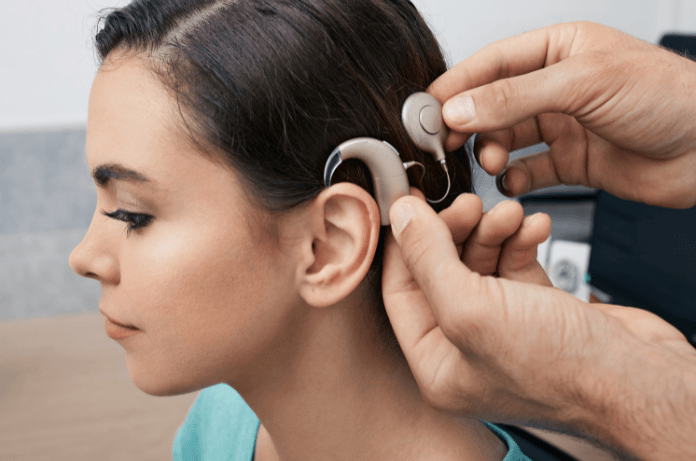Imagine a world where doctors could tweak brain activity to improve mental health without invasive surgery. Sounds futuristic, right? Well, the future is here. In an innovative move, the NHS is testing a groundbreaking brain-computer interface (BCI) device, Forest 1. This groundbreaking device tackles mental health conditions like depression and anxiety. With its potential to transform lives, this device is also stirring conversations about ethics, safety, and the very nature of human enhancement.
Let’s dive into what makes this technology a game-changer and the challenges it brings.
What’s This New Brain Device All About?
At the heart of the trial lies a £6.5 million experiment funded by the UK’s Advanced Research and Invention Agency (Aria). The star of the show is a device, Forest 1 – developed by US-based non-profit Forest Neurotech. Unlike traditional invasive implants that insert electrodes into the brain, this new device uses ultrasound technology to read and adjust brain activity—without penetrating the brain.
Here’s how it works:
- The Forest 1 device is implanted under the skull but remains outside the brain.
- It maps brain activity with high precision and sends targeted ultrasound pulses to “switch on” specific groups of neurons.
- These ultrasonic pulses can influence brain circuits responsible for mood, motivation, and even physical conditions like epilepsy, OCD, addiction, and depression.
Aria calls it “the most advanced BCI in the world” because it can work on multiple brain areas simultaneously. This makes it ideal for treating “circuit-level” disorders like depression and anxiety, which involve several parts of the brain.
The First NHS Trial: Forest 1
The trial, led by Aimun Jamjoom, a consultant neurosurgeon at Barking, Havering, and Redbridge University Hospitals NHS Trust, will recruit 30 patients. These are individuals who have had a portion of their skull temporarily removed to relieve brain pressure due to injury. This setup allows testing without additional surgery.
For two hours, participants will wear the device over the area where their skull is missing. During this time, researchers will monitor brain activity and assess whether the device can consistently influence patients’ motivation and emotional outlook.
“This is a less invasive technique, and the ability to offer a safer form of surgery is very exciting,” said Jamjoom. He highlighted that up to one-third of people with conditions like depression or epilepsy don’t respond to traditional treatments. For these individuals, this technology could be a game-changer.
Forest 1: The Magic of Ultrasound
Ultrasound technology isn’t just for pregnancy scans—it’s now a tool to unlock the mysteries of the brain. This device can:
- Create 3D maps of brain activity: By detecting tiny variations in blood flow, it achieves a spatial resolution 100 times better than standard fMRI scans.
- Influence neurons: By sending targeted ultrasound waves, it mechanically nudges specific neurons to fire.
The result? A device that can remotely alter activity in multiple areas of the brain.
However, safety is a concern. Prof. Elsa Fouragnan, a neurologist at the University of Plymouth, explained, “We are trying to minimize heat.” Ultrasound can heat tissue, so balancing efficacy and safety is critical.
Beyond Depression: Forest 1
The Forest 1 device is part of Aria’s broader £69 million precision neurotechnologies program, which funds 19 cutting-edge projects. These include:
- Lab-grown brain organoids to better understand brain disorders.
- Neural robotics for epilepsy treatment.
- Genetic editing of brain cells.
Founded in 2023 by Dominic Cummings, Aria is modeled after the US-based Defense Advanced Research Projects Agency (DARPA). Its mission? To fund high-risk, high-reward scientific ventures.
If the Forest 1 trial proves successful, the device could move to larger clinical trials for conditions like depression. This could open doors for treating other conditions like anxiety, PTSD, and even epilepsy.
The Ethical Dilemma: Forest 1
While the technology is thrilling, it raises important ethical questions:
- Data Ownership and Privacy: Who owns the brain data collected by these devices? Could it be misused by employers or insurance companies?
- Human Enhancement: Should we use this technology to improve cognitive abilities, or should it only treat disorders?
- Neuro-discrimination: Could brain data be used to judge someone’s job eligibility or insurance premiums?
As Clare Elwell, a medical physics professor at UCL, pointed out, “We’re lagging behind on addressing neuroethical issues.” While the technology moves quickly, the ethical frameworks are still playing catch-up.
What’s Next for Forest 1?
The trial is set to begin in March and will last for three and a half years. The first eight months will focus on regulatory approval, ensuring the device meets strict safety and efficacy standards.
If successful, Forest Neurotech plans to launch comprehensive clinical trials targeting disorders like depression. This could mark the beginning of a new era in mental health treatment.
With mental health conditions affecting millions worldwide, innovative solutions like the Forest 1 device offer hope for those who haven’t found relief through traditional methods. While ethical concerns must be addressed, this technology could transform how we think about mental health reported The Guardian.
A Call to Action for the Future
The Forest 1 trial is just the beginning. As we explore new frontiers in neurotechnology, it’s essential to strike a balance between innovation and ethics. Let’s support initiatives that prioritize patient safety and well-being while addressing the broader societal implications of such advancements.

